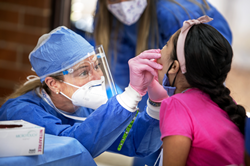
To date, the project has accumulated the largest depository of genetic information relating to global cleft conditions.
The first study of its kind, the IFS blends questionnaire findings with genetic data voluntarily provided by Operation Smile patients, their families and control groups. The goal of this study is to utilize the findings to help prevent cleft conditions before they develop in the womb.
VIRGINIA BEACH, Va. (PRWEB)
January 26, 2022
January is National Birth Defects Awareness Month, a nationwide effort to raise awareness of birth defects and the impact they have on individuals. On average, 1 in 700 babies throughout the world are born with a cleft lip or cleft palate, making it one of the most common conditions worldwide. To gain insights into the causes of cleft conditions, global surgical nonprofit Operation Smile has teamed up with the University of Southern California and Children’s Hospital Los Angeles to construct the International Family Study (IFS).
The first study of its kind, the IFS blends questionnaire findings with genetic data obtained from saliva samples voluntarily provided by Operation Smile patients, their families and control groups. Through Operation Smile’s partnership, the IFS can investigate risk factors, environmental exposures, and specific genes that increase the chances of developing cleft lip or cleft palate. The goal of this study is to utilize the findings to help prevent cleft conditions before they develop in the womb.
“We may know some things that increase the risk of cleft, but there is no singular reason – or at least not one we know of yet – that can explain why a child may be born with a cleft,” said Allyn Auslander, Associate Vice President of Research at Operation Smile. “This research aims to change that.”
Since its beginning in 2009, the study has been conducted in 8 different countries: the Democratic Republic of Congo, Guatemala, Honduras, Madagascar, Morocco, Nicaragua, the Philippines, and Vietnam. More than 17,032 samples have been voluntarily collected from over 7,777 families. To date, the project has accumulated the largest depository of genetic information relating to global cleft conditions.
Operation Smile advocates for those born with cleft conditions, many who are born in developing countries that lack the critically needed resources to provide timely medical care. Those left with untreated cleft conditions face difficulties eating, breathing, speaking and being accepted by many of their peers and communities.
Contributing risk factors for developing a cleft condition include lifestyle, environment, and genetics. Additionally, the research has revealed potential risk factors are cooking with wood fire and the use of well water, which are common practices in many developing countries.
“Globally, there are a lot of misconceptions around the cause of cleft,” continues Auslander. “From an environmental and lifestyle perspective, better understanding risk factors provides us with significant opportunities to intervene and improve the health of our families.”
The information the IFS is gathering will help Operation Smile put preventative measures in place for the communities they serve. By understanding the causes of cleft conditions, patients and their families can know the risks and behaviors that lead to a higher likelihood of developing a cleft condition, which can help prevent cleft conditions from happening in the future.
About Operation Smile
Operation Smile is a global nonprofit specializing in expert cleft surgery and care. Over the last 40 years, we have provided medical expertise, research and care through our dedicated staff and medical and student volunteers around the world, working alongside local governments, nonprofits, and health systems, and supported by our generous donors. Learn more at http://www.operationsmile.org or by following @operationsmile on social media.
Share article on social media or email:

